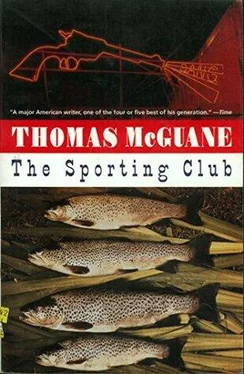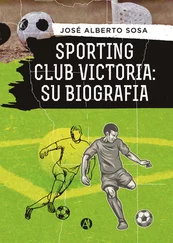Quinn didn’t know what it might be but asked, uncertainly, “Where was this?”
“Boy you are full of queshtons. Okay, this was a few mile north of Ishpeming on the Yellow Dog river.”
“Was that … a good location?”
“A bad location.”
“What was wrong with it?”
“What was wrong with it? Nobody knew where I was at. How was they to know where I was at?”
“I don’t know; but these people that wanted all these different baits…”
“Oh, God! They was steady customers! That ain’t a living!” Quinn, buffaloed, felt compelled to say he was sorry. Earl Olive took it in good grace.
“I was sorry too. I had a ton of live bait I couldn’t sell and I had to fish it all myself. I fished the Yellow Dog, the Escanaba, the Ontanagon, the Two Heart, come down here and fished the Pigeon, the Black, the Au Train, the Jordan and the Pere Marquette where, guess who I met?”
Cautiously, “Who?”
“Jack Olson! I was fished out. I had fished bugs, frogs, hellgrammites, mice and worms. I hit the Jordan in the middle of the Caddis hatch and must have killed every trout in the river. I ran into your Jack Olson up to the tavern in Manton and told him all about it. I thought he fit to kill me. He said he hated any a man who would fish a trout with bait. I said it was all meat to me and he walked out the tavern. Next time I seen him was last night in the same tavern and he asked me did I want this job. Well, I had got so I couldn’t look at a trout nor a piece of live bait; so I told him God damn right I wanted the job. So, then!” He went suddenly bashful. “Here I am!”
* * *
Representative John Olds, R. Mich., said: “Olson was a useful man. Which of us would deny that? But he was headstrong. He was hard to handle. He was a thorn in our sides. We are pleased to have him out of our hair. All this talk of property degenerating makes me tired. These woods and streams have a natural tendency to maintain themselves. We need a janitor and we’ve got one from the looks of this Olive. But whoever we have, our children and our children’s children will frequent these lands in perpetuam. The traditions of the Centennial Club, thanks to its board of directors, will continue de profundis. I thank you.”
“You’re welcome.”
“Yuh, okay.”
* * *
Mrs. Enid “Cooky” Silt said: “A wise guy. Someone should have slapped his face. I’m glad he’s gone.” Impossible, thought Quinn, could Olson have seduced Mrs. Silt? Very hard to imagine; one thought he had better taste. Quinn was frankly appalled at the thought of those Mamie Eisenhower bangs damp with lascivious sweat, the fly-tying hands of that admirable woodsman busy.
* * *
Old Mrs. Newcombe and her husband agreed that times change, off with the old, on with the new. It is written that history is no respecter of persons.
* * *
Quinn found Spengler, the chronicler of the Centennial Club, below the spillway of the dam that regulated the level of the lake and kept its constant shoreline. He was sketching the punks that grew in the backwater there. Beside him was a pair of binoculars. He was on the lookout for Kirtland’s warbler which lived only in this county and wintered on Abaco island in the Bahamas. The chronicle was to come out on the Fourth of July, the centennial celebration of the club’s founding. The chronicle would contain an account of punks, of Kirtland’s warbler and of Olson. He wasn’t talking till then.
* * *
Scott said: “Our ideas of declining fortunes have changed since the seventeenth century. In the Low Countries, Huizinga argued—” He went on, too.
* * *
Stanton said: “I’m not qualified to answer, old sport. Unfortunately, Olson has become a non-person for me. He never was. So, how can I tell you whether or not I’m glad he’s gone.” Then he grinned. “Isn’t the new guy god-awful?”
* * *
Two nights later, the shooting began, waking everyone. Five shots rang out in the muggy night from behind the lake. Stanton appeared at Quinn’s in the morning. Quinn dressed and they hiked around the back side of the lake, breaking through the swale and basswood tangle. Presently, they came upon a place where the cover had been battered down and trampled. In the middle were a grown doe and a very young buck of fifty or sixty pounds. Whoever had shot them had started to hog-butcher the doe but had got nervous and ripped loins off the two quickly and beat it. So the little buck was nearly whole; while the doe was vented up to the sternum with the glossy spillage of intestines and jellying blood. Since neither animal had been bled, it would be certain that even the meat was spoiled.
* * *
Quinn ate dinner at the lodge. He scribbled drafts of business letters beside his plate and when he was finishing the meal, Janey came in and sat opposite him and said, “There you are.” She had caught him unexpectedly and for a moment they conversed very unnaturally. He called for coffee and she put on her dark glasses, doubtless from the same embarrassment; and they cut off her softening eyes so that her nose and cheeks were clear beveling lines around the glasses. Quinn reached across and removed them. He said he hadn’t meant to make her nervous. He folded the glasses and pushed the dishes to one side. Janey undid the rubber band from a fresh pack of pictures. “You wanted more,” she declared.
“And I do.”
“Then get the expression off your face. Sometimes my memory fails and I use these to prove I was around last week. Here, let’s do it this way. You ask for a particular kind of picture.”
“How do you mean?” Quinn asked and she glanced at the pack.
“Okay, for example, ask me for a ridiculous picture.”
“Right. Give me a ridiculous picture.”
She handed him Stanton’s Harvard graduation picture.
“Now you think of one,” she said.
“A sad picture.”
“A sad picture,” she repeated as she went through the pack. “A sad picture.” She looked up. “Well, it turns out … they’re all sad.”
“Then give me them all.” She handed him the pack. “Why did you come over here tonight?”
“Because Vernor is giving me a very hard time.”
“What for?”
“Just for drill, he said.”
“All right, let’s never mind him and look at pictures. Who’s this?” It was her cousin Richard, a rock and roll singer who was killed in a plane crash. He came from a branch of the family that was out of favor for having struck oil enough for them all in East Texas and dissipating the fortune; because of this, Janey said, she herself had been taught all the little economies, a thousand useless tools to be used in the face of squandered fortunes. She said that this ruined branch was the family’s most interesting. It had taken its chances and burned hotly for a few years in the thirties when everybody else was lost in the dust bowl. They had thrown up an impressive mansion outside Orange, Texas, that, even though it belonged to them no more, was still there. They had owned three celebrated race horses: Steamboat, Shanty Duchess and Dogdancer who killed his trainer. True, nothing had worked out: the boy dead, the father, summoned for managerial malfeasance, was jailed for fraud. The mother, a poor farm girl at twenty, just as poor at sixty, affected antiquated French lace getups that showed the delicate tanning of the flatiron at home, an unmistakable, though mistaken, impression of down-at-the-heels gentility; she got the modicum of gallantry unaccorded the less romantic poor in the South.
The next picture is of the palmetto, the mother, the father, the artesian well; you still cannot see the house though its shadow has moved farther toward the well and sweeps past the couple who are old enough now that they must have been living in the house some time. The palmetto is larger, miraculously retaining the exact shape of its youth. Though the picture must have been taken ten years after the visit to Independence, Missouri, Quinn imagines that he sees in her face her failure to encounter the former President in his memorial library.
Читать дальше












